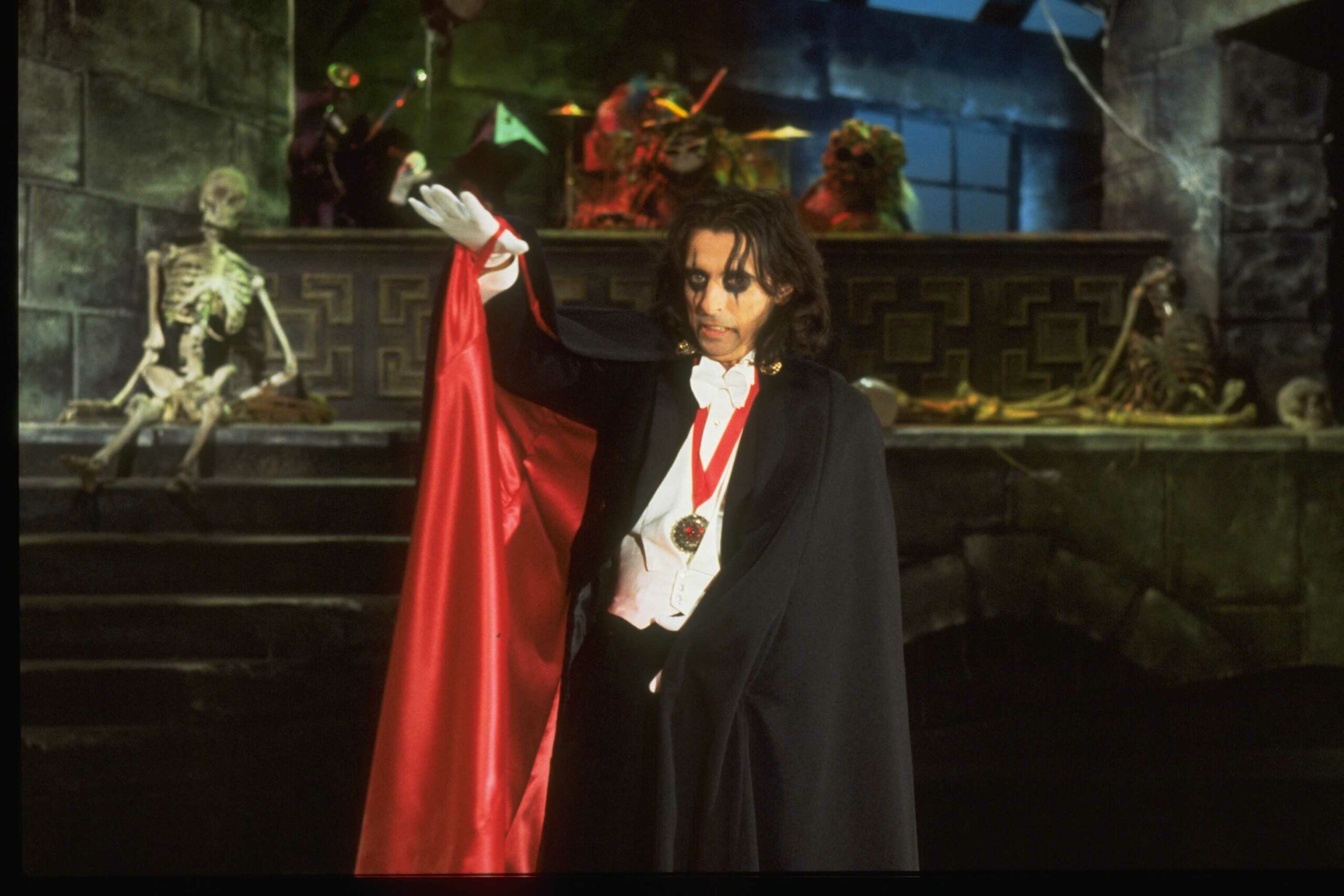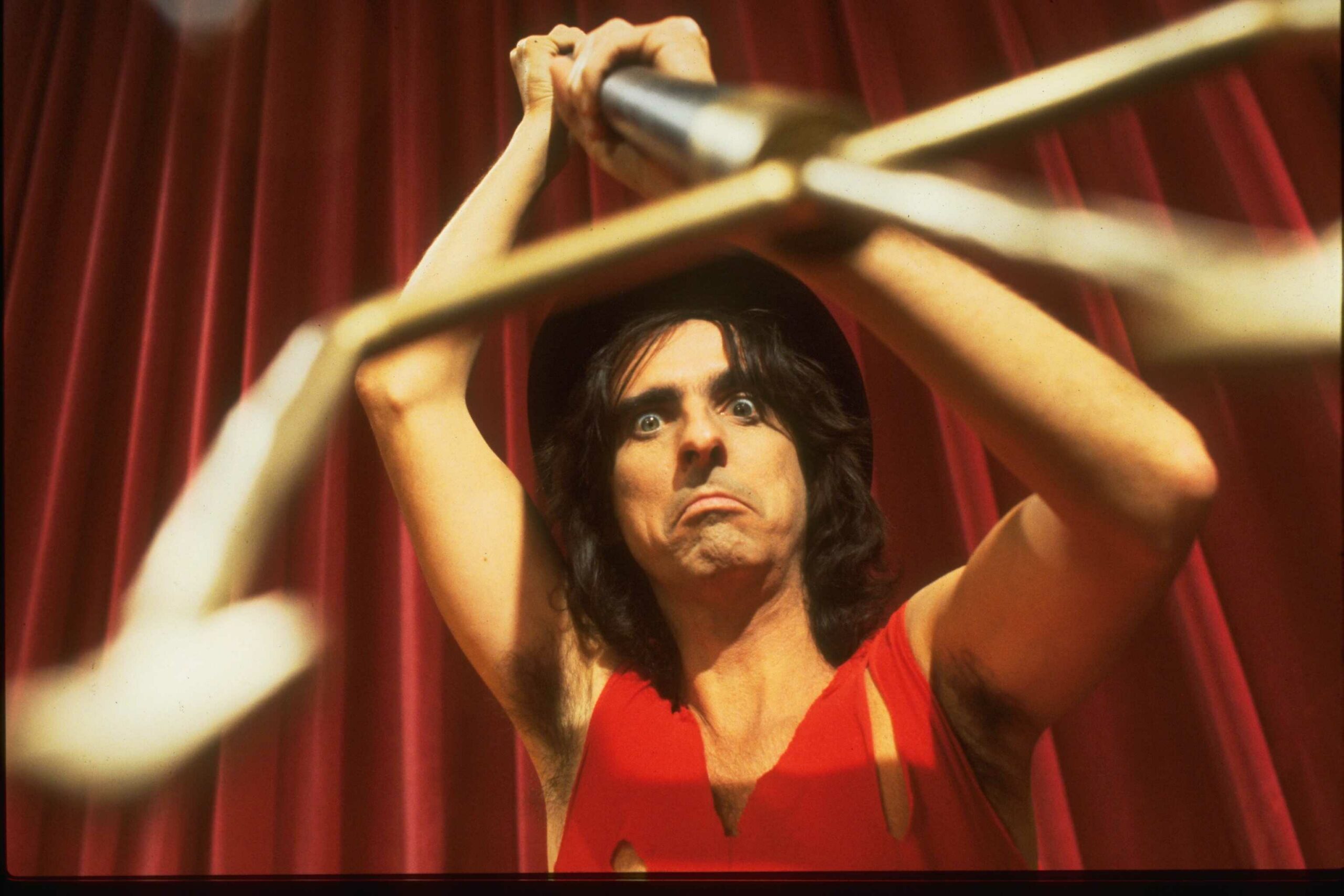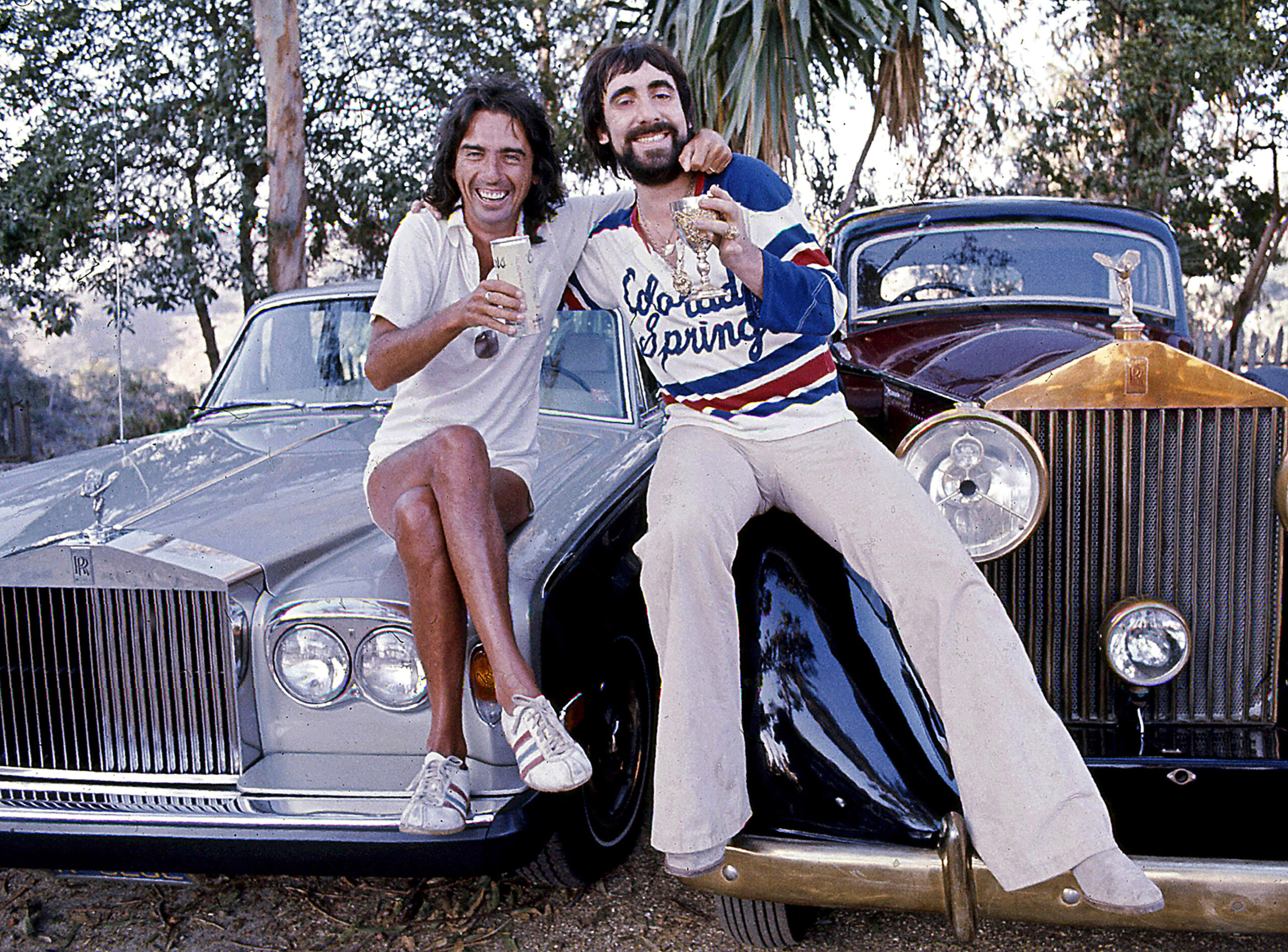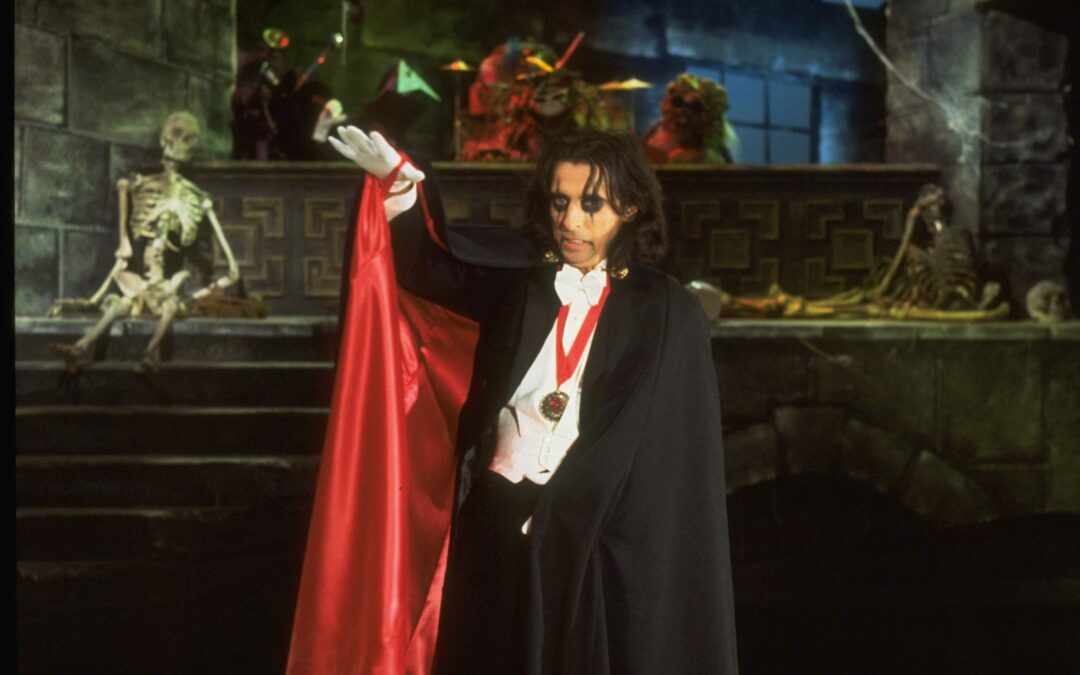Mojo
INTERVIEW
Alice Cooper
He’s the shock-rock pioneer who flirted with death, onstage and off, before “a miracle” intervened. “I’m going to play Alice Cooper every night,” said Vincent Furnier in 2017. “But I don’t have to be him.”

Hey Stoopid: Alice Cooper on the set of The Muppet Show in 1978.
T WOINNNNG! Backstage at the Grand Casino Amphitheater in Hinckley, Minnesota, the latest in a series of razor-sharp stiletto daggers slices through the air, thudding with murderous precision into a garishly decorated plank of wood hanging from a flight case. The black-clad figure flinging the blades from the other side of the room murmurs drily to his aide-de-camp, stood just to the right of the target, as he readies another stiletto. “Toby… Could you move a little further to the left, please?”
A smattering of uneasy laughter trickles around the room. The mood surrounding Alice Cooper has darkened since we first met him on his tour-bus earlier this afternoon – a grouchiness, an impatience, a faint-but-palpable edge now discernible. Showtime is fast approaching, and he’d doubtless rather be focusing on the concert he’s about to deliver – an unstinting hour and 40 minutes of high-drama rock’n’roll involving props, pyro, a twelve-foot Frankenstein’s monster and a graphic beheading-by-guillotine, a performance that would frankly exhaust rockers half Cooper’s 69 years – than be posing for photographs.
As MOJO gazes on, it’s clear that the Alice Cooper persona has reinhabited its earthly host: genial, Detroit-born preacher’s son Vincent Furnier, a man who starts six out of seven days with a leisurely 18 holes but resists all the other charms of retirement. “I’m sure Dylan doesn’t think he’s written his best song yet, nor Paul McCartney,” says Furnier. “And I believe my best song is still out there somewhere, too.”
Furnier/Cooper continues that quest with his 27th album, *Paranormal, a collaborative affair inspired by his experience with the Hollywood Vampires – a supergroup involving Joe Perry and Johnny Depp, and named after the ’70s LA drinking club that counted Furnier, Keith Moon, Harry Nilsson and Ringo Starr among its notably thirsty members. *Paranormal features guest turns from ZZ Top’s Billy Gibbons, U2 drummer Larry Mullen Jr. and, touchingly, the surviving members of Alice-Cooper-the-band’s classic line-up, who first convened as The Spiders back in mid-’60s Phoenix, Arizona, arrived in California as The Nazz, and in a blaze of eyeliner and misappropriated Rockettes costumes stunk up the peace’n’love vibe at the end of the decade as Alice Cooper.
A concert reunion with his old bandmates in Nashville a couple of weeks earlier has left Furnier in a nostalgic mood, but it’s also whetted his appetite for whatever’s next. “I don’t know how many years I’ve got left,” he says, “but as long as I’m here I’m going to do what I do best.”

Easy Action: Vincent Furnier (aka Alice Cooper) gets to the point.
On the subject of your new album title, have you ever had a paranormal experience?
It’s 1984, and I was starring in this horror movie, Monster Dog. I’d just gotten sober, and Joe Perry was coming out of rehab, so I said, ‘Joe, let’s write a song for this movie together.’ So, we went to [manager] Shep Gordon’s house in upstate New York, which was all by itself atop a hill. If you were going to find a location for a horror movie, this was the place. A lot of weird things happened. Taps I’d turned on were turning themselves off, my suitcase seemed to open or close every time I turned my back. At dinner, I said, I had the weirdest day today. And Joe says, ‘I did too. I put my strings down here and next thing I knew they were over there.’ And while we were eating, there was this sound in the basement, like people moving furniture around. Finally, I said, ‘Is anyone else hearing all this?’ It’s not like in the movies, where the hero grabs a flashlight and goes to see what it is – Joe and I were shaking like Abbott And Costello. We left the house. Shep said later, ‘Oh yeah, that house is weird. My mom had a dinner party there where the dining room table moved a foot to the right during dinner, and things were flying around the house.’ Apparently, the guy that wrote The Amityville Horror wrote it in that house.
Members of the original Alice Cooper band are on two tracks on the new record, Genuine American Girl and You And All Your Friends. What was it like, recording with your old bandmates again?
It was wonderful, working in the studio with them after 35 years. Neal Smith plays just like he used to play – Neal would find out how many drums Keith Moon had, and get one more. And then call Keith and tell him! And he played all of them. Bob Ezrin said once, Neal Smith plays like an octopus falling out of a tree. (laughs) Dennis Dunaway plays lead bass, he’s an Entwistle. And [guitarist] Mike Bruce comes up with great hooks. I got them all in the studio and let them go, and those are two of the best tracks on the album. It was like no time had passed. But then, we didn’t break up with any bad blood. There were no lawsuits, everybody was still friends – we’d just run out of creative juice. We had done seven albums in a row, every one of them bigger than the last. Everybody wanted to take time off, but I had this idea for the Welcome To My Nightmare album and tour, which was going to take another two years of solid work – I think I scared everybody off.
When you write a song, do you have the Alice Cooper persona in mind, or is it a more personal thing?
I write for Alice. Very little of Vince gets in there. If I were going to write for Vince, it would be a very different song. Alice is infinitely more interesting than Vince. He’s got a different sense of humour – darker, and more violent. He’s a dark vaudevillian. He has a Clouseau side – I don’t mind him slipping on a banana peel once in a while, when he’s trying to be so serious – and also a romantic side, with songs like Only Women Bleed and You And Me. I learned how to write songs from Chuck Berry: he could tell a story in under three minutes, and make it clever as hell. A lot of times I’d start with the title first, like Only Women Bleed. The audience might think I’m going after some menstrual thing there, but I’m not – I’m saying women bleed more, emotionally. Some of them bleed more physically, too. I didn’t realise it would end up as a women’s anthem. I just needed a ballad for Welcome To My Nightmare.
Is it still a thrill, as mild-mannered Vincent Furnier, to play Alice?
It’s great to play someone you’re not – I look forward to it every night. There was a period of time when I didn’t know where I started and Alice ended. Like, ‘Am I supposed to be Alice all the time? Do I have to keep drinking in order to be Alice? If I go to a bar tonight, should I bring a snake?’ Then I realised, that’s what killed Jim Morrison, Jimi Hendrix and Janis Joplin, that they felt they had to be that character all the time. They were drinking buddies of mine, they were my big brothers and sisters, and they all died. And I’ve come up with a character who’s even more intense, so is Alice going to kill me? Or am I going to find a way to co-exist with him?
It seems a question you struggled with for the best part of a decade.
I had to get sober before I understood. Alice is Alice, and I’m going to play Alice every night. But I don’t have to be him. And that took a little time to get used to. But it changed Alice, too – Alice was this whipping boy, he was society’s tramp, always getting hung or beheaded. After I got sober, I decided Alice was going to be this very arrogant mastermind, an Alan Rickman/Moriarty-esque character. I wasn’t the underdog anymore, I was now the dominatrix. I couldn’t play him the old way again – alcohol and drugs made him that way. Without them, I was much stronger, much healthier, and now Alice had to be violently in control of everything. He wasn’t just blowing in the wind, he was the mighty oak up there.
Where did the lurid stage-show and Alice’s murderous cross-dresser look come from?
We had this twisted view of what rock’n’roll should look like. We’d see The Who – this great, powerful, violent rock band – but behind them was a blank wall, this big, empty canvas. And I told the band, we’re that canvas. Whatever the lyrics say, that’s what’s going to happen onstage. That’s where the theatrics came from. Alice’s look came from watching [1962 psychological thriller] What Ever Happened To Baby Jane?, Bette Davis’s make-up all caked and cracked, and her lipstick all over the place. I said, Holy crap, that’s so good! My thing was wearing a pair of black leather pants and boots and my girlfriend’s slip, tearing it up and putting blood all over it, to make the audience ask, ‘What happened??’ We didn’t mind a little violence in the show. We’d play out our West Side Story fantasies, with real switchblades – we’d get cut, we’d need stitches afterwards. And people would go, ‘What??’ Because everyone was all peace and love back then. And we were not that at all, we were this weird sideshow.
“‘Peace and Love’, to me, was a huge phony thing. It was totally invented by drugs.”
Alice Cooper
You’ve said that in the late ‘60s you were the most hated band in LA.
We didn’t buy into the peace and love thing. We were art majors, we were Salvador Dali lovers. We understood that the National Enquirer was a much more fun read than the LA Times. We were the Enquirer, but on a concert stage. And the whole ‘peace and love’ thing, to me, was a huge phony thing. I think it’s a sweet idea. But it was totally invented by drugs, you know? We played a big show with Buffalo Springfield, Jefferson Airplane, The Doors, all these great bands, and there were 6,000 people there, with Steve McQueen and James Garner in the audience, a big deal. And we went on last, we came on with Out In The Street by The Who, and I looked like some kind of insane clown. We cleared that room in three songs. There was nobody left except the GTOs, my manager Shep and Frank Zappa. Frank said, ‘Anybody with that much negative energy, I gotta have on my label. You just scared the hell out of 6,000 people!’
How did you feel about that?
I kinda felt good about it – I knew that it wasn’t a great path to making a lot of money (laughs), but it proved that there was power in what we were doing. We were raw as hell then. We just didn’t care. We’d been kicked around so much, every record company had refused us. Then we went to Detroit, and people in Detroit totally got it. We played with Iggy and the Stooges, the MC5, and that was the point where we started making money, drawing a big audience every night. Detroit had an attitude. If you weren’t a hard rock band, you weren’t going to survive there. Donovan didn’t go down well there. Because Detroit was a factory town, like Newcastle or Glasgow – fighting and drinking was what they did best.
After you moved to Detroit in 1970, you started working with Bob Ezrin. What did he bring to the table?
Bob brought everything. He was our George Martin. Before him, we did anything we wanted to do. We had all these ideas, with nobody to put them into form. Then Bob entered the picture. He put us on a farm in Detroit for eight months and he re-taught us how to play, and how to think about a song – how to be dynamic, how to make three-minute songs that sounded great on the radio. And every hit we had after that was down to Bob Ezrin. I give him all the credit in the world, because we wanted to go off in a million directions, and he taught us how not to do that.
As the live show became more elaborate – chopping up babies, the guillotine, hanging yourself onstage – were you ever worried that it might overshadow the music?
It did overshadow the music. It didn’t bother me at the time, because it was so successful. And when your UK politicians like Mary Whitehouse and Leo Abse tried to get our stage-show banned, well… We couldn’t have hired two press people better than them. We sold out every record, every ticket… Thank you! The word-of-mouth made the show notorious. I think the public came to our side when the bigwigs tried to ban us. The people were like, ‘Oh really? You’re going to decide what we can see and not see?’ After that, we were the people’s band.
When success arrived for Alice, what did it do to you as a person?
Well, when you’re 25 years old, you’re indestructible. I was going out every night with Keith Moon, and Peter Sellers, and the Hollywood Vampires – I still to this day don’t remember if I was involved in [John Lennon’s] ‘Lost Weekend’ (laughs). I might have been the bartender… But those were my guys. I saw Harry Nilsson and Ringo every single night. And it was a blur, because I was 25, 26 years old, and I had all the money in the world, and all the popularity… Being a star is a very, very unnatural state. Here’s a bunch of kids who came from middle-class America, and are suddenly the biggest deals in the world, and there’s no book that says, ‘This is how you handle this…’ How we handled it was by partying. So, yeah, most of those years were a blur.

School’s Out: Cooper with legendary Who drummer Keith Moon, Mulholland Drive, Los Angeles in June 1976.
By 1972 rock had become political. As an apolitical person, was Elected a strange song for Alice to do?
Really, it was just us saluting the Who, their big riffs. And everyone hated Nixon so much at the time – they hated Nixon more than they hate Trump, and that’s what we were tapping into. Who’s the most unlikely person to run for office? Alice Cooper. It ended up being John Lennon’s favourite song. He’d come in every day and listen to the acetate, saying, ‘I love this record.’ He was very political, whereas we weren’t in the least bit political. But the record was such a great satire on it all. John told me he loved the power of it, and what it said, and it was the perfect time for that record. Though he said Paul would have done it better – well, duh, of course. And it went to Number 1 in England. We were like Jimi Hendrix, we broke in the UK before America, and then we broke all over the world.
After the Alice Cooper band split, at the height of your boozing, you made the crazily ambitious Welcome To My Nightmare. How honest was the title?
Nightmare was definitely scary, because I’d never worked outside of the band. I was thinking, ‘This could be huge or it could be a total flop.’ Shep and I put every penny we had into it. I hooked up with [guitarist] Dick Wagner, and I started working with different writers, which was new to me. But the songs were really good, and Bob Ezrin was back onboard, so I felt good about it. Then, once the album was done, we had five months of rehearsal for the live show, which was like a Broadway production. I thought, people are either going to love it or hate it. And they loved it. It did everything it was supposed to do – it broke all the records.
Sheryl, the woman you went on to marry, was a dancer on the Nightmare tour. How instrumental was she in your redemption?
Talk about biblical miracles! If I’d married anybody else, I would be dead. She was all of the things in my life that I needed. And it wasn’t just sexual – she was the part of my brain that was missing. I saw her during rehearsals, and there was never any doubt I was gonna marry her. Forty one years later, she dances better now than she did then. I love touring with her: getting ready for the show, putting my make-up on, and she’s next to me looking into the other mirror, putting her make-up on. It’s like an old vaudeville company.
In the late ’70s you committed yourself to a sanitarium to beat the booze, but then developed a cocaine problem and later relapsed with alcohol. You finally kicked your habits after being hospitalised with liver cirrhosis in late 1983. How did you do it?
I was the classic alcoholic. I had to drink in order to get something done. It got to a point where I was so good at hiding it that I could drink all day, and you would never know it. I was on this golden buzz at all times. I drank Seagrams VO and Coca-Cola, but I sipped it all day. Internally, it was killing me. I was like a chainsmoker, but drinking whiskey. I couldn’t feel any pain, but finally one morning I got up and started throwing up blood. I was bleeding internally. When I got in the hospital, the psychiatrist said, ‘How much do you drink onstage?’ And I said, I never drink onstage. He said, ‘So, Alice isn’t the problem – *you’re the problem.’ I absorbed that information, and when I came out of the hospital, I went right to a bar and ordered a Coca-Cola. I knew I’d be around alcohol the rest of my life, and that I’d get this craving, but I’d fight it off. But the craving didn’t come. I thought, Oh boy, tomorrow’s gonna be hell. I got up the next morning, no craving. For 35 years, not one craving for alcohol. It’s as if it never happened. I came out of the hospital, and it was eliminated from my life. And I have no willpower. It was a miracle. If there was ever a miracle, it’s Alice Cooper not craving a drink.
So how does your faith guide your life?
I was the prodigal son – I grew up in the church, went as far away as you could possibly go, and then I was drawn back, and I live that lifestyle now. People have a very strange picture of Christianity, that everybody’s right-wing. But really, it’s about my relationship with Jesus Christ, a one-on-one relationship. I just try to do what he would want me to do. And he didn’t give me all this talent to not use it. But there are parts of the show I won’t do anymore, because I don’t believe in them anymore, songs like Trash, or Bed Of Nails. There’s a lot of my songs that are very much warning against Satanism, saying, You really think hell’s gonna be getting high with Jim Morrison? I don’t think so. I think you’ve got to be careful who you’re inviting into your life. The occult’s a very dangerous thing to get involved in. When I first became Christian it’d be so funny; I’d walk into a room and everybody would feel like they had to be on their best behaviour. And I’d say, ‘Guys, I’d know all the words, okay? I invented three of them (laughs).’”
Looking back, what’s your take on your early ’80s records?
You mean my ‘blackout’ albums? Those are usually my fans’ favourite albums, because I don’t remember doing a lot of them, I remember very little of Special Forces [1981] and Zipper Catches Skin (1982)… Dada (1983), I was a bit more clear, because I was working with Ezrin and Dick Wagner again. The first of my ‘80s albums, Flush The Fashion, was recorded with Roy Thomas Baker and we were both just flying, out of our minds. But I listen to the album and it’s a good album. The other albums, the songs were good but the production was just awful. We were much more interested in drugs than in doing the album. My fans now say, ‘Do something off Zipper Catches Skin!’ and I go, Wow! I don’t think I can get to that place again.
Paranormal is your 27th studio album. What drives you now?
I feel better now physically than I ever have in my life. I’ll get up onstage tonight and do that show and I’ll be the only one who’s not breathing hard. I’m not making records now to build a new audience, I’m making record because there’s a huge fanbase around the world that wants to hear new songs. So why wouldn’t I make albums? It’s what I do. Why wouldn’t I go up onstage? I feel more at home onstage than just about anywhere else. It’s where I belong. If Sheryl and I go six months without a tour, we both get a little restless. And then in the middle of the tour we’re like, We can’t wait for the tour to be over (*laughs). I don’t have any desire to retire, and I’m not going to go fishing. What am I gonna do?
So, what’s left to achieve?
A few years back I started up the [non-profit charitable organisation] Solid Rock Foundation, and that’s a big deal for me. I was sitting watching a drug deal going down with these two 16-year-old kids on the west side of Phoenix, and I was thinking, how does that kid not know that he might be the greatest guitar player ever? What if there was an alternative to what they’re doing now? A place where they can go in for free and learn guitar, bass, drums, singing, dance, whatever? So we built this place, and we get a hundred kids a day there. A lot of these kids are born into the gang culture, and nobody ever gets in a gang and lives through it, comes out on the other end unscathed in a big mansion somewhere. They end up shot at, dead or in jail. We’re the alternative. We put on a show every year, the Christmas Pudding show, and we get stars to play. It’s a family show, though. Sheryl had [Mötley Crüe singer] Vince Neil pinned to the wall before the show and she says, ‘We’re not going to be throwing F-bombs around tonight, are we, Vince? You’re a good boy!’ She’s the enforcer. They listen to her, they don’t listen to me!
This article originally appeared in issue 286 of MOJO
Interview: Stevie Chick Images: Getty

